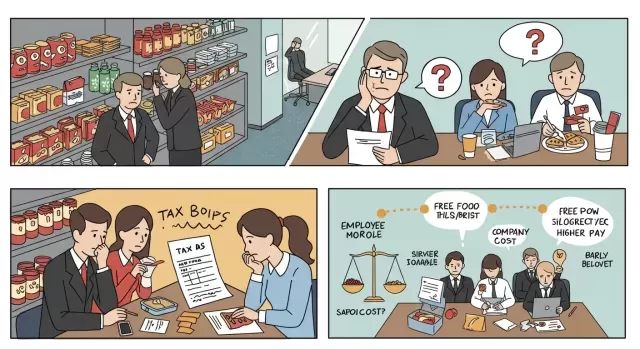The Future of Free Office Food: Tax Law Changes Threaten Workplace Perks

For many office workers, the allure of complimentary snacks and meals is a cherished perk, a small but significant benefit that brightens the workday and fosters a sense of community. From bustling tech campuses to traditional accounting firms, free food has become a staple in numerous U.S. workplaces, playing a role in attracting employees back to the office and boosting morale. But this seemingly secure perk might be facing an unexpected challenge due to shifts in tax regulations.
The Tax Deduction Sunset: What's Changing?
A key tax deduction that businesses have used for company-provided meals and takeout is nearing its end. This change, stemming from a provision in the 2017 tax law, is slated to take effect at the end of the year. The elimination of this deduction is projected to result in a significant increase in taxes for employers, estimated at $32 billion through 2034, according to the Joint Committee on Taxation.
The core of the issue lies in the gradual phasing out of a tax break that allowed companies to deduct a portion of the expenses associated with providing food to their employees. This deduction covered various forms of company-provided food, including meals served in on-site cafeterias and takeout options. With the deduction set to vanish, businesses are now faced with the prospect of absorbing these costs entirely.
The Snack Question: Are Office Snacks at Risk?
While the primary focus is on larger-scale meal provisions, there's also some uncertainty surrounding the fate of smaller office snacks. Christa Bierma, from the American Institute of CPAs, highlights an ongoing debate about whether these readily available snacks fall under the purview of the expiring tax deduction. If snacks are indeed included, employers could face a difficult decision about whether to continue offering them.
The Importance of Free Food: More Than Just a Perk
Free office food provides various important functions:
- Community Building: The ability to eat and socialize together contributes to a stronger sense of connection among employees.
- Convenience: On-site food options reduce the need for employees to leave the office, potentially increasing productivity and encouraging longer work hours.
- Employee Retention: Companies see the provision of free food and snacks as a valuable asset, especially when trying to retain and attract employees back to the office.
The Impact on Employees: What's at Stake?
The potential removal or reduction of free food perks could have several implications for employees:
- Decreased Morale: For many, free snacks and meals are a welcome benefit that enhances their overall work experience. Losing these perks could negatively impact morale and job satisfaction.
- Increased Expenses: Employees may need to allocate more of their personal budget to cover meals and snacks, potentially straining their finances.
- Reduced Convenience: Without on-site food options, employees may need to spend more time leaving the office to grab food, impacting their productivity and time management.
Will Companies Pull the Plug? Expert Opinions Vary
Although the elimination of the tax deduction presents a challenge, experts have mixed opinions on whether companies will completely eliminate free food perks.
- Nicholas Brown (Stanford University): Brown believes that companies are unlikely to cut free food as they see it as a primary incentive for employees to return to the office. He sees cutting the perks as shortsighted.
- James Atkinson (Society of Human Resource Management): Atkinson suspects that companies will not immediately eliminate the perks, especially if they feel it has a strong impact on employee morale.
- Christa Bierma (American Institute of CPAs): Bierma agrees that many companies will likely continue to offer the benefit, but they may consider reducing the generosity of their food offerings.
Factors Influencing the Future of Free Office Food
Several factors could play a role in determining whether companies choose to scale back or eliminate free food perks:
- Economic Conditions: Companies facing economic uncertainty may be more inclined to cut costs, including reducing or eliminating free food perks.
- Company Culture: Companies that prioritize employee morale and engagement may be more likely to continue offering free food, even without the tax deduction.
- Industry Standards: Companies may feel pressured to maintain free food perks if they are common in their industry, especially in competitive job markets.
Alternative Strategies: Adapting to the New Landscape
Instead of completely eliminating free food, companies might explore alternative strategies to manage costs while still providing valuable benefits to employees:
- Reducing Variety: Instead of offering a wide range of snacks and meals, companies could focus on providing a smaller selection of popular and cost-effective options.
- Limiting Availability: Companies could restrict the availability of free food to certain times of the day or days of the week.
- Subsidized Meals: Instead of providing completely free meals, companies could offer subsidized meals at a reduced cost to employees.
- Partnering with Local Businesses: Companies could partner with local restaurants or cafes to offer discounted meals or catering options for employees.
A Call for Prudence: Balancing Perks and Costs
The impending changes to the tax law present a challenge for businesses that offer free food perks to their employees. While the elimination of the tax deduction could lead some companies to cut back or eliminate these perks, others may find creative ways to adapt and continue providing valuable benefits. Ultimately, the future of free office food will depend on a delicate balance between the desire to attract and retain employees and the need to manage costs effectively.